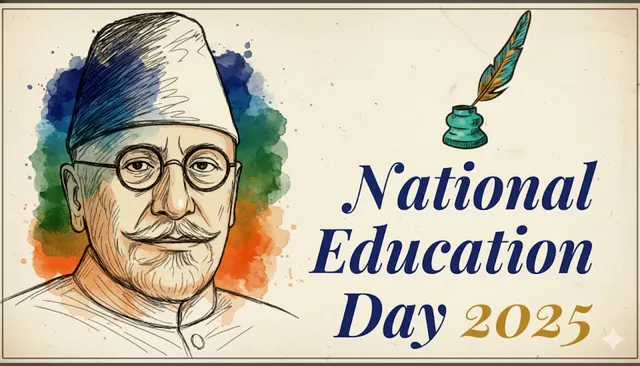- By Sarju Saran Tiwari
- Tue, 11 Nov 2025 10:51 AM (IST)
- Source:JND
National Education Day 2025: India is celebrating National Education Day 2025 across the country today, November 11, to commemorate the birth anniversary of Maulana Abul Kalam Azad. On this occasion, the nation pays tribute to the visionary leader who laid the foundation of modern education in independent India.
India's first Education Minister, Azad championed universal primary education, women's empowerment, and cultural education. His belief that "education imparted with the heart can revolutionize society" continues to inspire generations.
Why is National Education Day celebrated on November 11?
National Education Day is celebrated every year on November 11th to commemorate the birth anniversary of Maulana Abul Kalam Azad. Since its inception in 2008, educational institutions across India celebrate the day through various activities, including seminars, essay competitions, workshops, and awareness rallies, that emphasize the importance of literacy and the nation's commitment to accessible education for all.
It reminds us that true education is not just about achieving academic achievement, but about fostering critical thinking, innovation, and social progress.
Why Do We Celebrate Education Day To Commemorate Maulana Azad?
The day is named after Maulana Azad because of his unique contribution to shaping the educational landscape of modern India. His belief that education is the foundation of a just, integrated, and progressive society guided every policy decision he made.
Maulana Azad understood that true freedom required not only political independence but also the educational empowerment of all citizens, regardless of caste, class, or gender.
Maulana Azad’s Vision for Modern Education
Maulana Abul Kalam Azad played a significant role in shaping India's education system after independence. He helped establish premier institutions like the UGC, IITs, and IISc, ensuring quality higher education and promoting scientific research across the country.
His vision extended beyond academics; he encouraged education in Indian languages and supported art, literature, and culture. Institutions like the Sahitya Akademi, Lalit Kala Akademi, and Sangeet Natak Akademi reflect his commitment to preserving India's cultural heritage.

